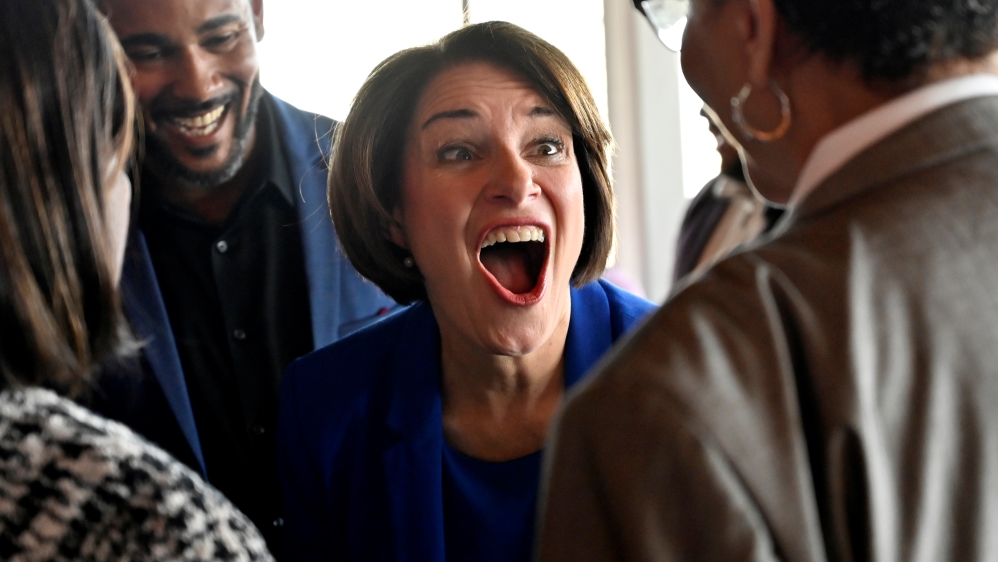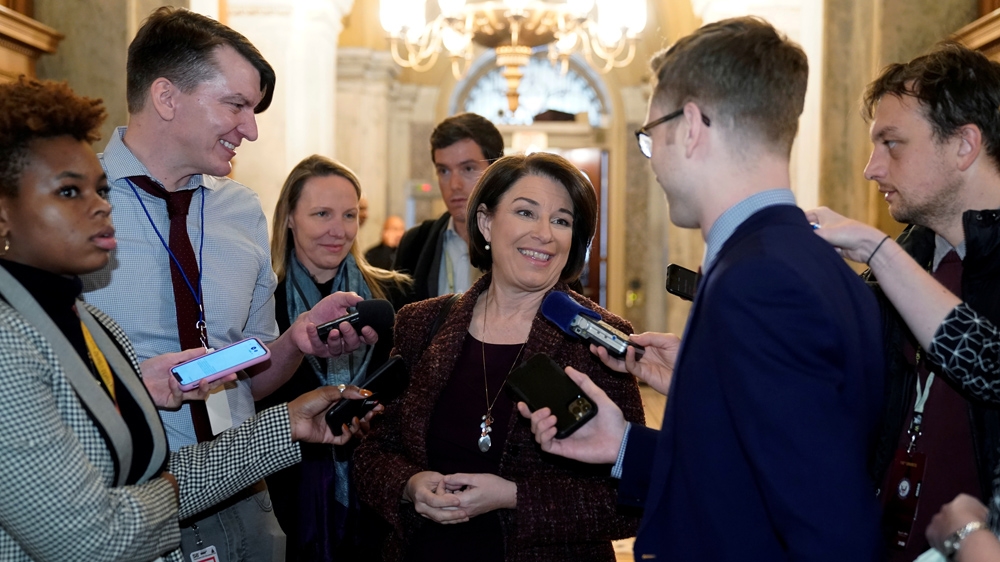Amy Klobuchar: Who is she, where does she stand on key issues?
Senator Amy Klobuchar dropped out of the 2020 Democratic presidential race just before Super Tuesday.

Editor’s note: Amy Klobuchar dropped out of the 2020 Democratic presidential race on March 2, just before Super Tuesday. This profile reflects who Klobuchar was as a candidate.
Amy Klobuchar likes to call herself the “Senator next door”, an approachable Midwesterner who took on the political old boys’ club and won, a bipartisan legislator who stands the best shot at beating Donald Trump in the general election.
Keep reading
list of 3 itemsBernie Sanders: Who is he and where does he stand on key issues?
Joe Biden: Who is he and where does he stand on key issues?
After languishing during the early days of the campaign, Klobuchar caught a second wind by delivering what was described as a “standout debate performance” in New Hampshire and a respectable third-place finish in that state’s primary election. Headed into South Carolina and Super Tuesday, however, she was still struggling to connect with the broader, more racially diverse Democratic base.
“Senator Klobuchar has worked really hard to try to carve out a space as a Midwestern moderate,” said Democratic consultant Edward Erikson, but she “really struggles on the big stage to be able to communicate clearly and effectively”.
Part of the problem, Erikson told Al Jazeera, is that Klobuchar is coming across as inauthentic. “She is very canned. She sounds focus-group-tested, which I’m sure she is. She sounds overly practised, which I’m sure she is. And she is rather shaky in her presentation.”
The senator has sought to turn that blandness and moderation into a positive, however: “If you feel stuck in the middle of the extremes in our politics, and you are tired of the noise and the nonsense, you’ve got a home with me,” Klobuchar says in a recent campaign video.
A ‘moderate’?
Raised in the US state of Minnesota, Klobuchar often refers to the people who influenced her life: her grandfather, who she says “worked 1,500 feet underground in the iron ore mines” in northern Minnesota; her father, a newspaper reporter; and her mother, a teacher.
After graduating with degrees from Yale University and the University of Chicago Law School, she worked for over a decade as a prosecutor in the Twin Cities (Minneapolis and Saint Paul, Minnesota) before being elected prosecutor in Hennepin County, the state’s most populous county, in 1998.
In 2006, she became the first woman ever elected to represent Minnesota in the US Senate. She faced a Republican opponent in that election whom she painted as a close ally of then-President George W Bush, whose popularity had dropped dramatically. She won with 58 percent of the vote.
On the campaign trail, Klobuchar touts he bi-partisan credentials and an ability to get things done. Over a third of the bills she has co-sponsored in the Senate were introduced by a Republican and over two-thirds of the bills she herself introduced were co-sponsored by a senator from across the aisle.
In her 2015 memoir, Klobuchar writes that public servants “should be expected to work honestly and collaboratively with others who were presumably elected to do the same thing”.
Lynn Vavreck, a professor of American politics and public policy at the University of California, Los Angeles, said Klobuchar has really focused on electability issues and on promoting herself as the candidate who can beat Trump in the general election.
“Obviously, when she says that she means, ‘I will not build a wall on the border, I will not separate children from their families at the border, I will not ban all abortion,'” Vavreck told Al Jazeera.
The problem though is that all the other Democratic Party candidates share those positions, too – and to win the nomination she needs to set herself apart. “The thing about elections is that you cannot adopt the same positions as your opponent, otherwise you all are going to split the vote equally. You have to find a dimension on which you are different from your opponent.”

Policy
Klobuchar has struggled to gain support among African Americans, who for decades have made up a sizeable portion of Democratic Party voters. An NBC News/Wall Street Journal poll released on February 21 found that more than a third of African American respondents – 35 percent – said they had reservations or were uncomfortable with her candidacy.
Her more centrist positions may also fail to inspire more progressive Democrats who want to see the party taking a stronger stance on issues, said Erikson. “That bipartisan, cross-party vision that Amy Klobuchar is presenting is not going to galvanise people. It might make her effective at governing … but governing and getting elected are two different things.”
So far on the campaign trail, Klobuchar has said that Medicare for All, a national health insurance plan championed by Bernie Sanders and Elizabeth Warren, “is something we can look to for the future, but I want to get action now”. In an advertisement released before the Nevada caucuses, she also said Americans “deserve a president who’s focused on a healthcare plan to lower premiums; not a pipe dream that risks your financial future”.
Free-college-for-all is also something Klobuchar doesn’t support, saying economic factors make it unrealistic. “If I was a magic genie and could give that to everyone and we could afford it, I would,” she said during a CNN town hall before the New Hampshire primary.
On climate change, she has committed to rejoining the Paris Agreement, restoring the Clean Power Plan that sets state greenhouse gas emission limits, and ending federal fossil fuel subsidies.

Criminal justice
Like Democratic presidential hopeful Michael Bloomberg, Klobuchar has been criticised for the “tough-on-crime” stance she championed as a Minnesota prosecutor, as well as her failure to bring charges in cases involving people killed by police.
Civil rights groups asked her to drop out of the race over a 2003 case in Minneapolis in which a black teenager was convicted of killing an 11-year-old girl who died after being hit by a stray bullet while doing her homework.
Myon Burrell, who has maintained his innocence, was sentenced to life in prison. In advance of the Iowa caucuses, an investigation by The Associated Press news agency found that “new evidence and myriad inconsistencies” in the case raised questions “about whether [Burrell] was railroaded by police”.
Klobuchar has tried to defuse the criticism by saying, “I’ve been very clear: all of the evidence needs to be immediately reviewed in that case – the past evidence and also any new evidence that has come forward. I’ve called for that,” she said when pressed on The View about it.
She has also stressed her support for criminal justice reform to address “the institutional racism that is in our criminal justice system right now”, and her support for the First Step Act, a law signed last year that seeks to reduce recidivism and reform US sentencing laws. She is now advocating for a Second Step Act to reform sentencing provisions at the state and local levels, too.
But Klobuchar has struggled to get to the same level of name recognition – or the same amount of attention paid to her policy positions – as some of her opponents, including Sanders, Joe Biden and Bloomberg, said Vavreck.
“Still a lot of people don’t have any familiarity of her, so it’s very hard for a candidate like that to knock out someone with such high familiarity levels,” she said, adding that “her campaign has not done as much as it needed to do to change that.”
